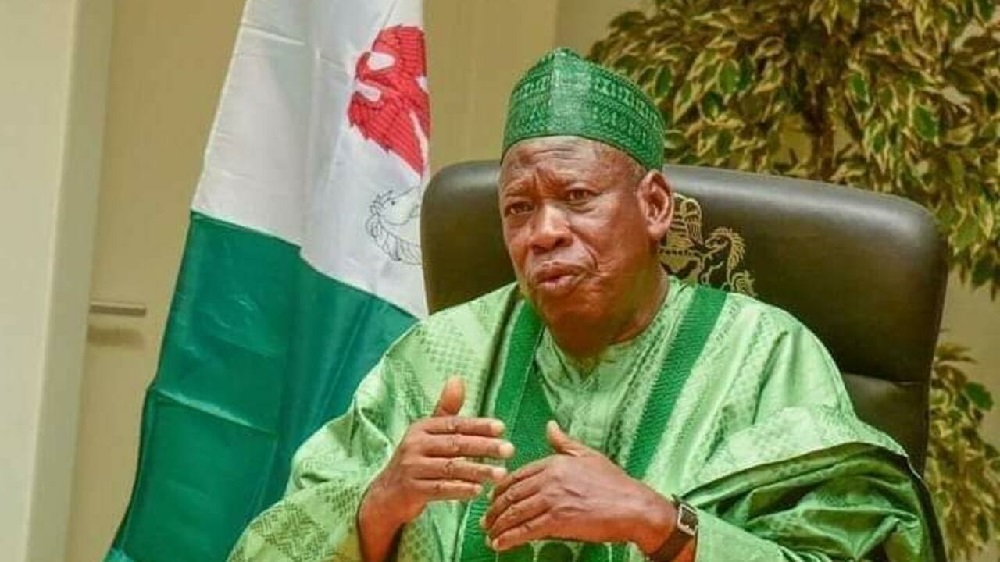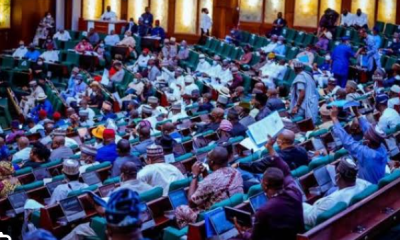News
Macron’s call for elections in France adds to fears of financial woes

Investors made clear on Tuesday the depth of their concerns over President Emmanuel Macron’s gamble to call for new elections in France, driving up the nation’s borrowing costs, pushing down stock prices and prompting the Moody’s ratings agency to warn it may downgrade French sovereign debt as risks of political instability rise.
Mr. Macron’s dissolution of the lower house of Parliament on Sunday after his party was battered by Marine Le Pen’s far-right party in European Parliament elections has ignited concerns that the government could grind to a stalemate. The turmoil has focused attention on France’s fragile finances, and the prospect of legislative gridlock that could undermine the government’s ability to address it.
“This decision will not ease the economic challenges facing the country,” Philippe Ledent, senior economist at ING Bank, wrote in a note to clients. Public finances and the performance of the French economy will be “at the heart of the electoral campaign,” he added.
As the head of France’s conservative party on Tuesday called for an alliance with the far right to beat back Mr. Macron ahead of two rounds of national voting that will start on June 30, investors punished French stocks, sending the Paris Bourse down 1.33 percent, after a sharp fall on Monday.
The yield on France’s 10-year government bonds rose sharply for a second day amid investor unease over France’s ability to manage its finances. Bond yields are indicative of the government’s borrowing costs, and elevated levels would make it harder to stimulate the economy and manage the country’s debt.
France is suddenly facing uncharted territory. The prospect that Ms. Le Pen’s party, the National Rally, could triumph in the hastily called legislative elections — which could weaken Mr. Macron’s grip on power and possibly force him to govern with a prime minister from his political opposition — risks piling economic havoc atop the political toll.
“Fiscal and domestic economic policies are set by the government, which needs a majority for its legislation in Parliament,” said Holger Schmieding, chief economist at Berenberg Bank in London. “For a fiscally challenged France, new parliamentary elections add a level of uncertainty.”
The turmoil comes with the French economy in a rough patch, as the wars in Ukraine and Gaza, economic slowdowns in Germany and China and record-high interest rates take a bigger-than-expected toll on growth. Mr. Macron’s government recently warned that growth would be weaker than expected this year, and his finance minister, Bruno Le Maire, was charged with finding more than 20 billion euros in savings quickly as the nation’s finances deteriorate.
After the government spent lavishly during the pandemic to support the economy and shield consumers from high energy prices, French debt has climbed to 3 trillion euros, or 110.6 percent of gross domestic product. The government deficit for 2023 stands at €154 billion, accounting for 5.5 percent of gross domestic product, one of the worst performances in the eurozone.
France is now at risk of breaching European Union budget rules that restrict government borrowing and is likely to be sanctioned next week by the European Commission, the E.U. executive branch. On Tuesday, Mr. Le Maire warned that France could be thrown into a “debt crisis” if Ms. Le Pen’s party gained power.
Paris had been increasingly concerned about French debt being downgraded by international rating agencies, which increases borrowing costs. On May 31, Standard & Poor’s downgraded France’s debt rating, rattling the government, whose economic credibility has been one of its main political assets.
Then on Tuesday, Moody’s warned that Mr. Macron’s maneuver could deepen France’s financial woes by creating “a polarized political environment.” By dissolving the National Assembly, Mr. Macron had increased the risks that France will not be able to bring its budget back in line, raising the prospect of a further downgrade.
“There is a high risk of greater political instability in the future,” the agency said, adding that Parliament could be thrown into political gridlock for at least a year because the winner of the upcoming elections was unlikely to have an absolute majority. That could mean that almost any legislation Mr. Macron puts forward would be blocked, including measures to cut government spending needed to avoid breaching the European Union’s fiscal rules.
The danger is that France’s high debt balloons even further, which could lead to a faster-than-expected rise in interest payments, Moody’s added.
Ms. Le Pen and her firebrand protégé, Jordan Bardella, have backed higher public spending to address issues that have driven waves of voters to the National Rally party, especially a loss of purchasing power brought by high inflation and energy costs, and demand for job creation in areas that have been devastated by industrial losses to globalization.
Mr. Macron has sought to play the role of a European leader during Russia’s invasion of Ukraine, but the National Rally has assiduously been courting voters, especially in rural areas.
Ms. Le Pen’s party won by large margins this weekend in places that have lost jobs to deindustrialization. The National Rally has grabbed bigger audiences for its pledges to bolster purchasing power, create employment through “intelligent” protectionism and shield France from European policies that expanded globalization.
Mr. Macron has been trying to counter the rise of National Rally, which has seized on the economic slowdown, immigration issues and regulatory requirements imposed by the European Union to attract disenchanted voters.
Now in the middle of his second term, Mr. Macron has sought to show that he was moving France back to business, burnishing its image especially with foreign investors. He has overhauled France’s rigid labor code to make it easier for companies to hire and fire and is streamlining France’s generous unemployment system.
He is also overseeing an enormous subsidized industrialization program that has attracted hundreds of billions of euros in commitments from multinational companies. These include the creation of four big battery plants for electric cars in northern France and a beefed-up pharmaceutical industry with new investments from Pfizer and Novo Nordisk, which will expand production of its popular Ozempic and Wegovy weight-loss drugs.
Last month, Mr. Macron hosted hundreds of global chief executives at the Palace of Versailles for an annual business conference that drew large new pledges, including a €4 billion investment by Microsoft for a new data center in eastern France.
Even so, France’s economic slowdown has been noticeable, particularly to voters who have swung to Ms. Le Pen’s party. Many feel inequality has widened, rather than narrowed, as Mr. Macron pledged, in the seven years since he took office.
News
AMMC Partners NUJ-FCT On Infrastructural Development

News
UBEC plans new template for basic school fund disbursement

The Universal Basic Education Commission on Tuesday announced plans to introduce a new template for disbursing counterpart funds under the Universal Basic Education programme.
This was disclosed by the Executive Secretary of the commission, Aisha Garba, during an interactive workshop with State Universal Basic Education Boards in Abuja.
Garba explained that the Federal Government, through UBEC, had recently restructured the delivery of basic education nationwide to align with four strategic pillars aimed at improving access and quality across states and the Federal Capital Territory.
She identified the pillars as expanding access to basic education, especially for rural and underserved populations; enhancing the quality of teaching and learning nationwide; strengthening accountability and the effective use of education financing; and optimising monitoring and institutional systems for quality service delivery.
She said, “The Hope Education Project of the present administration is a performance-for-reward initiative designed to support states that judiciously utilise resources in line with these four pillars.”
She added that the new approach had made it necessary to develop fresh templates that will guide SUBEBs in preparing work plans to access UBE intervention funds under the framework of the Hope Education Project.
Also speaking at the event, UBEC’s Deputy Executive Secretary for General Services, Tunde Ajibulu, described the workshop as timely and essential.
He stressed that the realignment of basic education delivery made the introduction of the new templates crucial.
“We expect you, as implementers of basic education in your respective states, to contribute positively and help develop workable templates,” Ajibulu said.
News
Ganduje loses bid to quash $413,000, N1.8bn bribery charges

A Kano State High Court on Tuesday dismissed an application filed by former Kano State Governor and current National Chairman of the All Progressives Congress, Dr. Abdullahi Ganduje, challenging the court’s jurisdiction to hear a bribery and misappropriation case against him.
The Kano State Government brought 11 counts against Ganduje, his wife Hafsat, son Umar, and five others, alleging bribery totalling $413,000 and misappropriation of N1.38 billion.
The other defendants include Abubakar Bawuro, Umar Abdullahi Umar, Jibrilla Muhammad, Lamash Properties Limited, Safari Textiles Limited, and Lasage General Enterprises Limited.
Delivering her ruling, Justice Amina Adamu-Aliyu dismissed all preliminary objections raised by the defendants, describing them as incompetent and lacking merit.
She ruled that the charges filed on May 13, 2024, were competent and that the matter should proceed to trial.
The judge further issued a summons to the sixth defendant, Lamash Properties Limited, and adjourned the case to July 30 and 31, 2025, for hearing.
Ganduje, his wife Hafsat, and son Umar, had through their lawyer, Mrs. Lydia Oyewo, filed a preliminary objection dated November 18, 2024, challenging the court’s jurisdiction and seeking to have all charges quashed.
In response, counsel for the state government, Adeola Adedipe (SAN), filed a counter-application dated October 22, 2024, urging the court to dismiss the preliminary objections for lacking merit.
Similarly, counsel for the third and seventh defendants, M.N. Duru, (SAN), submitted a motion on notice dated October 18, 2024, supported by a 14-paragraph affidavit and a written address, asking the court to uphold their application.
Counsel for the fifth defendant, Muhammad Shehu, also filed a motion dated October 18, 2024, and urged the court to grant it with substantial costs against the complainant.
Abubakar Ahmad, representing the sixth defendant, filed a preliminary objection dated September 9, 2024, supported by a nine-paragraph affidavit.
Additionally, counsel for the eighth defendant, Faruk Asekome, filed a notice of preliminary objection dated October 18, 2024, supported by a five-paragraph affidavit and written address, also seeking dismissal of the charges.
Justice Adamu-Aliyu, however, ruled that the objections lacked merit and cleared the way for the trial to proceed.
-

 News17 hours ago
News17 hours agoJust in: Another major headache as 3 PDP senators defect to APC
-

 News17 hours ago
News17 hours agoCourt Jails Two Six Months for Naira Abuse in Lagos
-

 News19 hours ago
News19 hours agoUnion seals Lagos company over racial discrimination of workers
-

 News17 hours ago
News17 hours ago$1.43m scam: Ajudua on the run as Supreme Court orders his return to prison
-

 News19 hours ago
News19 hours agoCBN warns public against fraudsters claiming to act on its behalf
-

 News15 hours ago
News15 hours ago10 WAEC students still missing as Rivers women demand Sole Administrator’s intervention
-

 News15 hours ago
News15 hours agoReps reject bill on rotational presidency among six geopolitical zones
-

 News16 hours ago
News16 hours agoIf sight led me, I wouldn’t have married my wife, says Pastor Enenche





